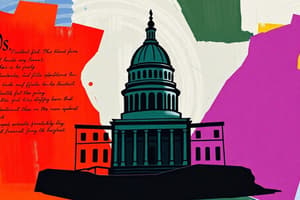Podcast
Questions and Answers
What is the focus of Article I?
What is the focus of Article I?
Article I of the U.S. Constitution gives Congress its powers and limits.
What powers are granted in Article I?
What powers are granted in Article I?
Article I grants Congress its powers and limits.
What is the focus of Article II?
What is the focus of Article II?
The executive branch and its role in U.S. government.
What powers are granted in Article II?
What powers are granted in Article II?
What is the focus of Article III?
What is the focus of Article III?
What powers are granted in Article III?
What powers are granted in Article III?
What is the focus of Article IV?
What is the focus of Article IV?
What is the focus of Article V?
What is the focus of Article V?
What is the focus of Article VI?
What is the focus of Article VI?
What is the focus of Article VII?
What is the focus of Article VII?
How many amendments have been ratified?
How many amendments have been ratified?
Flashcards are hidden until you start studying
Study Notes
Article I
- Article I establishes the legislative branch of the U.S. government, known as Congress.
- Congress is tasked with creating laws and consists of two chambers: the Senate and the House of Representatives, making it a bicameral legislature.
- It outlines the powers and limitations of Congress, including aspects such as taxation and regulation of commerce.
Article II
- Article II focuses on the executive branch, detailing the responsibilities of the President of the United States.
- The executive branch's primary role is enforcing laws at the federal level.
- Specific powers include serving as Commander-in-Chief of the armed forces, overseeing various government departments, granting pardons, and appointing Supreme Court justices.
Article III
- Article III addresses the judicial branch, primarily the federal court system, including the Supreme Court.
- The judiciary's main function is to interpret laws and ensure their application, as well as review legal cases.
- Congress is granted the authority to determine the number of Justices and establish inferior courts, while the Supreme Court hears significant cases involving government officials.
Article IV
- Article IV emphasizes states' rights and the relationships among states within the Union.
- It includes provisions for the admission of new states and guarantees a republican form of government in each state.
Article V
- Article V outlines the process for amending the Constitution, allowing flexibility for future changes.
Article VI
- Article VI establishes the supremacy of the Constitution, stating it holds the highest authority in the U.S. legal system.
- It requires that all debts incurred before the Constitution's ratification remain valid.
Article VII
- Article VII addresses the ratification process of the Constitution, specifying how it would be officially adopted.
Amendments
- A total of 27 amendments have been ratified to date, allowing for changes and additions to the Constitution since its original ratification.
Studying That Suits You
Use AI to generate personalized quizzes and flashcards to suit your learning preferences.




